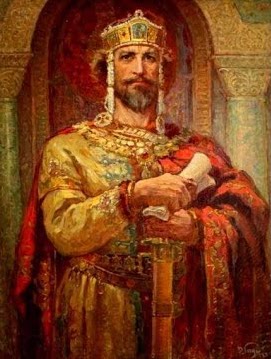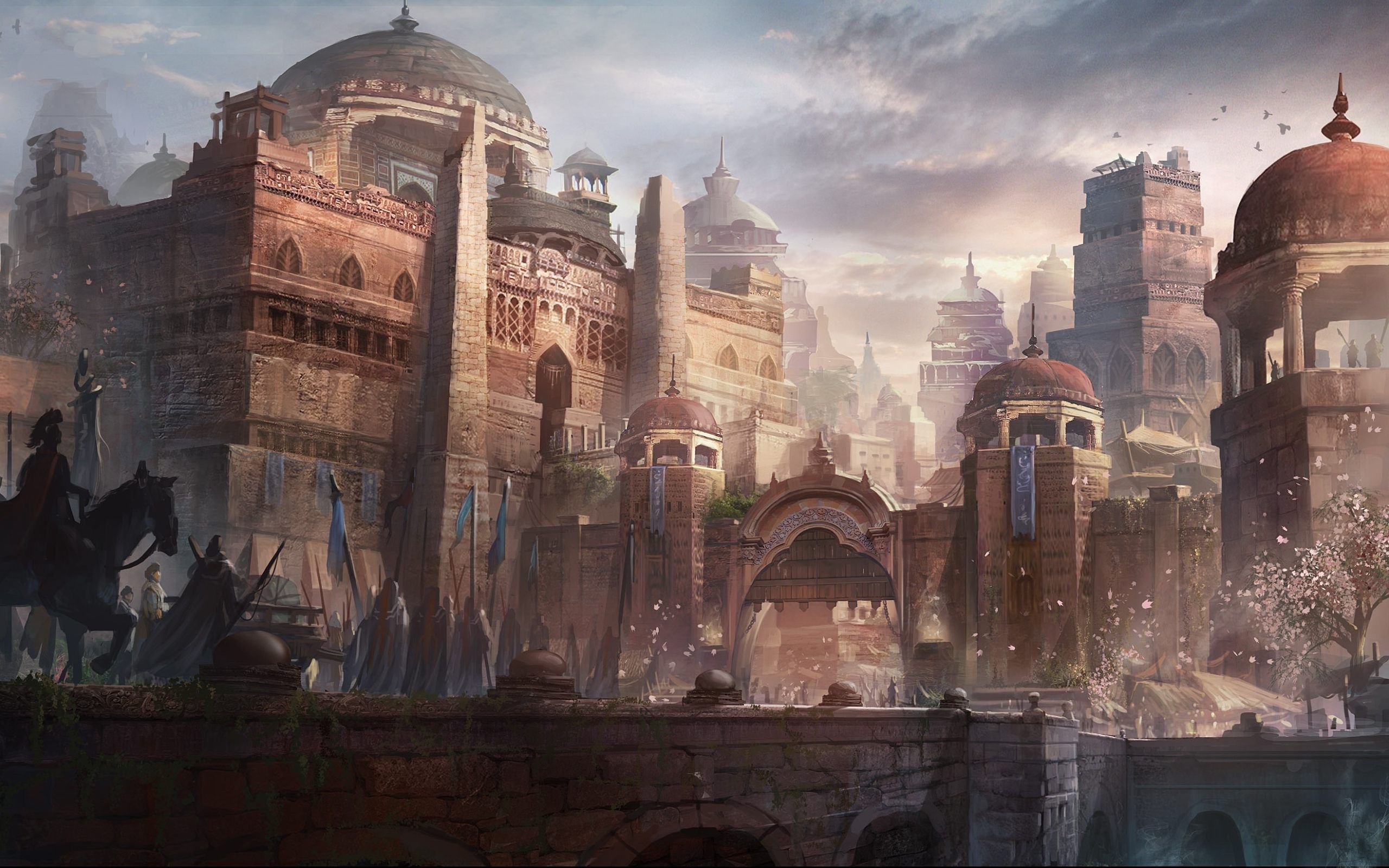Emperor Roman IV Vasilaiós
Emperor and Autocrat of the Rasenna Roman Chrysatine (a.k.a. Vasilaiós (The Royal)
The famed "Vasilaiós" and among the most influential of all Rasennan emperors. Famously called the 1st Ecclesia which codified the imperial cult into a properly organized religion and founded the two branches of the Ecclesian faith in the Pankosima of the east and the Mundana of the west.
Physical Description
General Physical Condition
Known both in his time and in successive generations as a fairly frail and weak man
Mental characteristics
Personal history
Perhaps no single Rasennan ruler has come into the office with such potential and wisdom as Roman IV. Son of Agranes Chrysatine, the middle child of Emperor Manuel III, Roman from an early age displayed a great deal of intelligence and was a polymath by the age of fifteen. Roman inherited a deep love of theology from his father, who was the sitting head of the imperial cult. This love of theology developed into a deep understanding of religious law and studies which proved to be what propelled Roman to call for a wide-spanning council of religious authorities which codified the loose religion of the empire into an official doctrine. A young Roman was seen as a threat to power and was put under house arrest by his uncle Emperor Manuel IV. It was under house arrest that Roman garnered support from his own captors and secretly began orchestrating the usurpation of his hated uncle. Using the animosity felt by members of the imperial guard toward the emperor, Roman had his uncle blinded, castrated, and sent into exile and himself crowned emperor the next day.
Some initially thought the new emperor would make a poor ruler, he had never been on a campaign and had little experience in government, and was not a well-known figure due to his prolonged captivity. Roman would prove these doubters wrong as he emerged as an energetic and exciting ruler with boundless energy like that of Dicorus so many years ago. Initially, Roman set about resettlement projects which formalized the conquests of his predecessors. These resettlements initially proved to be a drain on the treasury and Roman was mocked as a money waster by the general public. These resettlements in the new territories fully came back under imperial control and more effectively paid their taxes and supplied manpower that was badly needed.
Roman sponsored the creation of a new liturgy for the imperial cult which concluded with the official 1st Ecclesia being codified and solidified the doctrine and theology of the imperial cult. From the rule of Roman Vasilaiós or "Of the Royal Blood" came the bedrock of the Ecclesia, the formalized church of the former imperial cult. Roman would also focus his attention on his extensive codification of Rasennan law codes which formed the backbone of state law all the way to the present. On top of all this, Roman's personal writings on topics of statecraft and diplomacy aided Rasennan rulers after him in their personal dealings with diplomats of differing ethnic backgrounds. Roman wrote extensively about dozens of ethnicities he encountered at his court which has proved a valuable window into the demeanor and customs of these people in Roman's day.
Overall, Roman's rule would be nearly three decades of the height of centralized imperial power, his administration led with seamless efficiency which led to no major rebellions during his time on the throne. This era of peace led to a romanticization of the rule of the Vasilaiós as he would come to typify the office of the emperorship during the Dominate era. The thirty years of strong and peaceful rule of the Vasilaiós ended with his quiet passing at the age of 71 from natural causes. So passed one of the greatest Rasennan emperors and among the most benevolent, successful, and peaceful rulers in world history.
After Roman's death, his grandaughter's husband George Masele would succeed him at the dying emperor's request. George himself was a popular figure and was the grandson of the general Alexander Masele who's revolt Roman's uncle Manuel had put down. Roman's proclamation of George as his successor successfully placated the army which had never truly supported him during his lifetime. George would rule successfully in his own right but his son would oversee the disaster at Tarakoun and become the last emperor of the Chrysatine dynasty which had successfully restored order to the empire after the 40-year Anarchy it endured as well as brought it under the shine of its last true golden age.
Some initially thought the new emperor would make a poor ruler, he had never been on a campaign and had little experience in government, and was not a well-known figure due to his prolonged captivity. Roman would prove these doubters wrong as he emerged as an energetic and exciting ruler with boundless energy like that of Dicorus so many years ago. Initially, Roman set about resettlement projects which formalized the conquests of his predecessors. These resettlements initially proved to be a drain on the treasury and Roman was mocked as a money waster by the general public. These resettlements in the new territories fully came back under imperial control and more effectively paid their taxes and supplied manpower that was badly needed.
Roman sponsored the creation of a new liturgy for the imperial cult which concluded with the official 1st Ecclesia being codified and solidified the doctrine and theology of the imperial cult. From the rule of Roman Vasilaiós or "Of the Royal Blood" came the bedrock of the Ecclesia, the formalized church of the former imperial cult. Roman would also focus his attention on his extensive codification of Rasennan law codes which formed the backbone of state law all the way to the present. On top of all this, Roman's personal writings on topics of statecraft and diplomacy aided Rasennan rulers after him in their personal dealings with diplomats of differing ethnic backgrounds. Roman wrote extensively about dozens of ethnicities he encountered at his court which has proved a valuable window into the demeanor and customs of these people in Roman's day.
Overall, Roman's rule would be nearly three decades of the height of centralized imperial power, his administration led with seamless efficiency which led to no major rebellions during his time on the throne. This era of peace led to a romanticization of the rule of the Vasilaiós as he would come to typify the office of the emperorship during the Dominate era. The thirty years of strong and peaceful rule of the Vasilaiós ended with his quiet passing at the age of 71 from natural causes. So passed one of the greatest Rasennan emperors and among the most benevolent, successful, and peaceful rulers in world history.
After Roman's death, his grandaughter's husband George Masele would succeed him at the dying emperor's request. George himself was a popular figure and was the grandson of the general Alexander Masele who's revolt Roman's uncle Manuel had put down. Roman's proclamation of George as his successor successfully placated the army which had never truly supported him during his lifetime. George would rule successfully in his own right but his son would oversee the disaster at Tarakoun and become the last emperor of the Chrysatine dynasty which had successfully restored order to the empire after the 40-year Anarchy it endured as well as brought it under the shine of its last true golden age.
Education
Received a fairly specialized education from his father Agranes as well as directly tutored by high-quality academics and religious authorities of his time
Employment
Rasennan Prince
Emperor and Autocrat of the Rasenna
Emperor and Autocrat of the Rasenna
Accomplishments & Achievements
Successful provincial resettlement program
Called the first Ecclesia which codified the teachings and doctrine of the Imperial Cult
Very successful administrator and diplomat with allies and enemies alike
Ensured three decades of stability and peace during his reign
Called the first Ecclesia which codified the teachings and doctrine of the Imperial Cult
Very successful administrator and diplomat with allies and enemies alike
Ensured three decades of stability and peace during his reign
Failures & Embarrassments
Fostered a culture of academic priority when military affairs needed to remain in focus
Died and left the state without his personal leadership which led to the disaster at Tarakoun
Died and left the state without his personal leadership which led to the disaster at Tarakoun
Mental Trauma
Suffered under the house arrest of his uncle
Intellectual Characteristics
Quisitive
Intellectual
Restrained
Intellectual
Restrained
Morality & Philosophy
Intelligence with applied restraint and prudence becomes wisdom
Personality Characteristics
Motivation
Bring stability and strong leadership to the state
Virtues & Personality perks
Wise
Academic
Capable
Generous
Diligent
Kind
Academic
Capable
Generous
Diligent
Kind
Vices & Personality flaws
Conservative
Trusting
Vain
Trusting
Vain
Social
Family Ties
Son of Prince Agranes
Grandson of Manuel III and Prosera Ymisinikes
Grandfather of Antheria Chrysatine, mother of Emperor Roman V
Grandson of Manuel III and Prosera Ymisinikes
Grandfather of Antheria Chrysatine, mother of Emperor Roman V
Religious Views
Roman took a vested interest in codifying aspects of society he thought needed reformation. Roman's outlook on religion was that he considered it too unbalanced and unsatisfactory in providing its practitioners an avenue of true worship. He was a deeply religious man, going back to his father's education of him, and longed to extend this love of theology to his people and the wider world. His calling and presiding of the 1st Ecclesia earned him blessed status for both branches of the faith who owe him a great deal for their existence.
Social Aptitude
Known as a well-mannered and well-respected orator and conversationalist. Roman continued the tradition of the emperor as a figure above courtly engagement and was often a distant figure to those who served him. He was rarely seen publicly conversing with anyone outside of the arranged formalities that befitted his office. In rare accounts of his personality, he was known as a soft-spoken man with a very even-keeled temperament. Roman was never rattled, never thrown off by others, and always thoughtful and deliberate in his engagement with those around him.
Mannerisms
Sometimes characterized as a monotonous and robotic figure, Roman was a statesman and authority figure first and a human being second. His upbringing was one of intense pressure and standards of conduct and rarely if ever, did the veil of Roman IV Vasilaiós slip and reveal a man behind the curtains.
Relationships

Current Location
Ethnicity
Other Ethnicities/Cultures
Honorary & Occupational Titles
Imperator
Dominus
Autocrat of the Rasenna
Faithful Emperor of the People
The Pious, Faithful and August
Dominus
Autocrat of the Rasenna
Faithful Emperor of the People
The Pious, Faithful and August
Date of Birth
5th of Larce
Date of Death
28th of Herrena
Life
387 B.E
316 B.E
71 years old
Circumstances of Birth
Son of Agranes Chrysatine
Circumstances of Death
Died of natural causes
Birthplace
The Red Palace of Rasca
Place of Death
The Purple Palace in Komneia
Family
Spouses
Nereida Vardane
(Wife)
Siblings
Children
Gender
Male
Eyes
Light Brown
Hair
Curly, Dark Brown
Skin Tone/Pigmentation
Tan
Height
5'9
Weight
170 lbs
Quotes & Catchphrases
"How it dooms a man's soul if he conquers the whole world but never conquers himself."
Belief/Deity
The Magna Ecclesia
Aligned Organization
Other Affiliations
Mykran
Agrihenian
Galuk
Character Prototype
Constantine VII and Antonius Pius



Comments